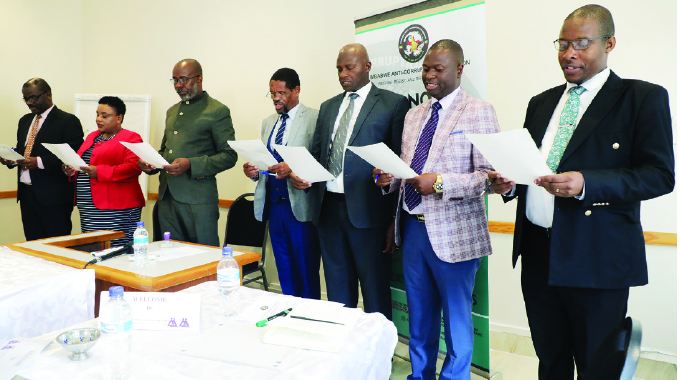Corruption fight: Zinwa bosses sign integrity pledges

Wallace Ruzvidzo Herald Reporter
Zimbabwe continues to make concerted efforts to combat corruption in private and public institutions, with the setting up of integrity committees contributing immensely to the cause, the Zimbabwe Anti-Corruption Commission (ZACC) said yesterday.
Notable successful integrity committees thus far include those for the Zimbabwe Revenue Authority (Zimra), the Zimbabwe National Road Administration (Zinara), Mutare City Council, National Railways of Zimbabwe (NRZ), Great Zimbabwe University, Gwanda State University, Tobacco Industry and Marketing Board (TIMB), the National Pharmaceutical Company (NatPharm), ZESA, TelOne and the Midlands State University, among others.
Speaking at an integrity committee training workshop in Harare yesterday where Zimbabwe National Water Authority (Zinwa) senior management signed integrity pledges, ZACC Commissioner Mrs Mabel Ndakaripa Hungwe said the integrity committees were a proactive rather than reactive approach to fighting graft.
“The Zimbabwe Anti-Corruption Commission, as an institution constitutionally mandated to take a leading role in the fight against corruption in both the public and private sectors, and currently preoccupied with the determined pursuit of National Development Strategy 1 (NDS 1) objectives and Vision 2030, fuelled the country’s introduction of the National Anti-Corruption Strategy (NACS), which was launched by His Excellency President E.D. Mnangagwa on 11 July 2020,” she said.
“Integrity committees and integrity pledges have been included into NACS as behavioural change and value-based anti-corruption programmes that have been designed and are being implemented in accordance with the United Nations Convention Against Corruption (UNCAC), to which Zimbabwe is a State party.
“The UNCAC requires state parties to take steps to fight corruption, including encouraging individuals, organisations and society to participate.”
Mrs Hungwe said integrity committees had become part and parcel of entities’ organisational structures as they oversee and spearhead the prevention of corruption and other related vices.
She said integrity pledges are vows to act honestly and openly in all parts of one’s life, as well as to promote openness, accountability, ethical behaviour and obedience to the law.
“Integrity committees serve to strengthen the link between the Commission and its institutions by continuously reporting corrupt practices and other improprieties in institutions and exchanging anti-corruption information,” she said.
Comm Hungwe said Zimra has an interesting narrative to tell regarding the success of their integrity committee, as you will hear in their presentation.
In Zambia, she said, the benefits of integrity committees to institutions have included, among other things, organisations self-cleansing, facilitation of ethical decision-making through the use of best practice documents such as codes of ethics, codes of conduct, and conflict of interest policies, reduced incidences of corruption and other related crimes, increased enforcement of best practices, improved institutional images, and improved services.
Zinwa chief executive Engineer Taurai Maurikira said integrity committees were a vital cog in the fight against corruption and their establishment was a step in the right direction.
“These committees will, among other things, help reduce instances of corruption through preventive measures and other mechanisms meant to enhance the detection and elimination of corruption within the workplace.
“The integrity committee, which is being trained today, consists of individuals carefully selected for their fortitude, integrity and exemplary character at the workplace, whom senior management believe will robustly and vibrantly help tackle the scourge of corruption that may be present within the Authority,” he said.











Comments